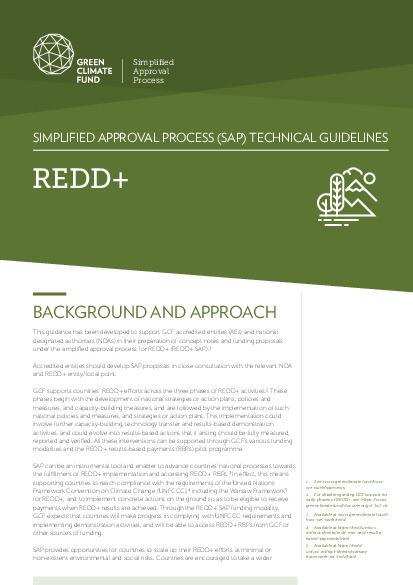Resources for the SAP
Dedicated templates and examples annexes for Concept Notes and full Funding Proposals have been developed for the SAP. These examples provide guidelines and may be used as a reference for submitting complete Funding Proposals under the SAP.
e-Learning course for SAP
GCF developed an e-learning course on the Simplified Approval Process to provide detailed information on the key elements required for SAP Funding Proposals, as explained by GCF experts. After completing the module, participants are expected to have the necessary knowledge and information to prepare robust project proposals.
Guidelines
We've written technical guidelines and manuals that are designed to help NDAs and AEs in writing and submitting their projects under the SAP. Translations in French and Spanish are also available for some materials.

Reporting guidelines for the Simplified Approval Process (SAP)
14 Dec 2023
This guideline document responds to decision B.32/05 made by the GCF Board to develop guidance and templates for the Accredited Entities (AEs) on building a results-based monitoring and reporting system, based on the GCF integrated results management framework to simplify the annual performance report requirements and templates and accelerate disbursements.

Programming guidelines for the Simplified Approval Process
21 Dec 2023
The SAP Programming Guideline, a vital element of our extensive GCF documentation suite, equips stakeholders with essential insights into the SAP's key objectives, policies, and a range of tools. Grounded in the GCF Investment Framework, the guideline delineates the Investment Criteria and the Fund's impact goals. It aids project developers in determining whether the SAP is their optimal funding avenue, guiding them through the nuances of proposal preparation and providing detailed steps for submitting SAP projects or programmes.

Simplified Approval Process (SAP) funding proposal preparation guidelines: A practical manual for the preparation of SAP proposals
01 Dec 2022
These guidelines have been developed to support GCF accredited entities (AEs) in the preparation of funding proposals under the simplified approval process (SAP) pilot scheme.

SAP Compendium
17 Sep 2021
A key element that drives the simplification of the preparation of a SAP proposal is the clarity, at the onset, of what are the activities that can be eligible for the GCF simplified approval. This is one of the main elements that this Compendium offers to all those involved in originating a SAP intervention.

Annex VII: SAP Review Toolkit
09 Sep 2022
This toolkit has been developed to guide the appraisal of concept notes and funding proposals submitted under the Green Climate Fund (GCF) Simplified Approval Process (SAP). The toolkit is designed in a checklist format, offering a set of questions that frame the focus of the review stage. The objective of the toolkit is also to provide Accredited Entities, National Designated Authorities and the stakeholders involved in in the preparation of SAP projects/programmes with an in depth and clear view on the type and quality of information that should be provided when developing SAP proposals for the GCF.

SAP Technical Guidelines: Water security
21 Feb 2023
This publication provides technical guidance for the preparation of simplified approval process (SAP) proposals for water security projects. GCF defines the water sector as encompassing surface freshwater resources and groundwater, but not oceans. Since the water sector is interlinked with several other sectors, such as agriculture and ecosystems, it is necessary to delineate its scope.

SAP Technical Guidelines: Energy efficiency for industry and appliances
21 Feb 2023
This publication provides technical guidance for the preparation of SAP proposals. Energy efficiency (EE) is the process of reducing the energy consumption of infrastructure, facilities, machines, devices, products, services, business processes, activities and transport. It can be thought of as the first fuel of a sustainable world and as such it has a key role in ensuring cost-effective energy transitions.

SAP Technical Guidelines: Renewable energy
21 Feb 2023
This publication provides technical guidance for the preparation of SAP proposals. Renewable energy (RE) is produced using natural resources that are constantly replaced within the human timescale. Just as there are many natural sources of energy, there are many technologies that can help to harness RE sources. Solar photovoltaic (PV) is the most well- known, wind power is the most widespread and hydropower is one of the oldest. Other RE technologies harness geothermal energy, solid waste or ocean-wave energy to produce heat or electricity.

SAP Technical Guidelines: Cities and climate change
21 Feb 2023
Traditionally, cities are defined as large human settlements, with no one standardized definition applied internationally. Frequently, national governments have criteria they use to define urban areas. These criteria can vary to include aspects such as administrative boundaries, living conditions or population density. Another approach is what is termed “urban agglomeration”, which considers the extent of an urban area, or sometimes, that of a built-up area, to identify a city’s boundaries.

SAP Technical Guidelines: Ecosystems and ecosystem services
21 Feb 2023
The publication provides technical guidance for the preparation of SAP proposals. The thematic area of ecosystems and ecosystem services encompasses all natural environments and the productive uses that are based on them. This can range from environments not directly impacted by human activities – for example, remote rainforests, alpine regions or coral reefs – to environments that are intensively managed – such as agricultural areas or managed forests for timber production. Given that there are thematic areas specifically addressing water security, agriculture and food production, and forest management, the emphasis in this thematic area is on natural or less intensively managed environments.

SAP Technical Guidelines: Forests and land use
21 Feb 2023
This publication provides technical guidance for the preparation of SAP proposals. The thematic area of forest and land use encompasses forests and other multiple land-cover types where forests are a prominent component of the landscape. This can range from natural forests, where ecosystems are not directly impacted by human activities (e.g. primary forests) to more intensively transformed landscapes – such as secondary growth forests, degraded forest landscapes, agroforestry systems and trees outside forests, sustainably managed forests and forestry plantations.

SAP Technical Guidelines: Transport
21 Feb 2023
The publication provides technical guidance for the preparation of SAP proposals. Although there is no one standard definition of the transport sector, it can be described as including all kinds of transportation, such as road, rail and maritime transport, and aviation.

SAP Technical Guidelines: Agriculture and food security
21 Feb 2023
This publication provides technical guidance for the preparation of SAP proposals. The agriculture thematic area encompasses agricultural production, land-use change caused by agricultural production and the food system in general. Agricultural production covers crop production and livestock. In addition to agricultural production the food system includes all steps from “farm to fork”: post-harvest handling, storage, manufacturing, processing, transport, retailing, consumption and food loss and waste at all levels across the supply chain.

Guidelines on preparing the economic and financial analysis for SAP proposals
18 Jun 2019
To aid in assessing SAP proposals against its Investment Framework, GCF may require entities to submit economic and/or financial analyses with funding proposals. This guidance is intended to clarify GCF’s expectations for these analyses, including documentation requirements and technical standards.

Guidance for preparing a pre-feasibility study under the Simplified Approval Process
31 Jul 2019
GCF has introduced the Simplified Approval Process Pilot Scheme (SAP) as a way to apply for GCF funding for smaller-scale projects or programmes. It is specifically designed for adaptation or mitigation initiatives that require a GCF contribution of no more than USD 10 million which have minimal environmental and social risks.

Guidelines for the environmental and social screening of activities proposed under the Simplified Approval Process
10 Jan 2018
The purpose of this document is to provide guidance for accredited entities on the environmental and social screening of activities proposed for GCF financing under the Simplified Approvals Process (SAP) Pilot Scheme.
Webinars

Introductory Webinar on the Update of the Simplified Approval Process (SAP) policy
July 2022
The GCF Board adopted the Update of the Simplified Approval Process (SAP) policy at the thirty-second meeting of the GCF Board (B.32) held on 16-19 May 2022. The Introductory Webinar on the Update of the Simplified Approval Process (SAP) policy will provide an introduction to the changes approved in the SAP policy at B.32 including, the key decision points, changes to the eligibility requirements for SAP projects/programmes, and the Secretariat simplification measures. The webinar will...

Introduction to Simplified Approval Process and the Private Sector
October 2020
This virtual side event of the third annual GCF Private Investment for Climate Conference provides participants with an understanding on how countries, GCF accredited entities and partners proposing private sector investments to the GCF can benefit from the use of the GCF Simplified Approval Process (SAP) modality. Providing an interactive space where an overview of the SAP and GCF Private Sector Facility (PSF) is offered, the webinar will adopt a hands-on approach through the presentation of...

Simplified Approval Process: Introduction to the Online Submission System
August 2018
In this webinar conducted in cooperation with UNITAR, GCF provides a preview of the upcoming Online Submission System (OSS) used to receive concept notes and funding proposals for consideration under the Simplified Approval System (SAP).







